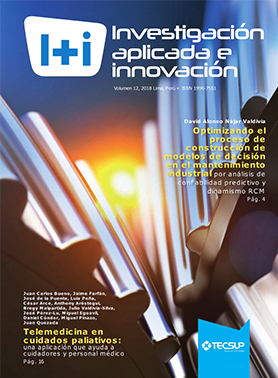Neuro Fuzzy Control for an Inverted Rotational Pendulum
DOI:
https://doi.org/10.71701/75pvye53Keywords:
Rotational inverted pendulum, neuro-fuzzy controller, hybrid learning, LQRAbstract
This article describes the design of a fuzzy controller for an inverted rotational pendulum, which adds the advantages of the knowledge of an experimented user and the adaptive capabilities of neural networks. The system is designed for two degrees control of the rotational pendulum, i.e. angle of the pendulum and angle of the platform; this rotational inverted pendulum, being a sub-acting system, is controlled only by a DC motor which is in turn connected to an Arduino microcontroller. To achieve the control, it was implemented a two-module neuro-fuzzy system using the 4 main variables of the system (two angles and their variations) and then trained using hybrid learning. To complement the controller, it was coupled with an energy shaping method to swing up the pendulum. The controller was implemented and compared with a traditional linear quadratic regulator (LQR) controller showing similar performance. The main advantage of the new controller is its adaptation to system variations.
Downloads
References
Agrawal, R., y Mitra, R. (2013). Adaptive Neuro Fuzzy Inference Structure Controller for Rotary Inverted Pendulum. Proceedings of International Conference on Advances in Computing. Springer: New Delhi,
1163-1170.
Åström, K., y Furuta, K. (1996). Swinging up a pendulum by energy control. IFAC Proceedings volumes. 29(1), 1919-1924.
Furuta, K., Yamakita, M., y Kobayashi, S. (1992). Swing-up control of inverted pendulum using pseudostate feedback. Journal of Systems and Control Engineering. 206(49), 263–269.
Grossimon, P., Barbieri, E., y Drakunov, S. (1996). Sliding mode control of an inverted pendulum. Proceedings of 28th Southeastern Symposium on System Theory, Baton Rouge, Los Angeles, 248-252.
Jang, J. (1993). ANFIS: adaptive-network-based fuzzy inference system. IEEE Transactions on Systems Man and Cybernetics. 23, 665-685.
Moreno-Valenzuela, J., Aguilar-Avelar, C., PugaGuzmán, S., y Santibáñez, V. (2016) Adaptive Neural Network Control for the Trajectory Tracking of the Furuta Pendulum. IEEE Transactions on Cybernetics. 46(12), 3439-3452.
Rani, M., Selamat, H., Zamzuri, H., Ahmad, F. (2011). PID controller optimization for a rotational inverted pendulum using genetic algorithm. Fourth International Conference on Modeling, Simulation and Applied Optimization, Kuala Lumpur, 1-6.
Siva, M., Dasu, B., y Ramesh, G. (1995). Design of LQR based stabilizer for rotary inverted pendulum system. IJCTA. 9 (29), 21-29.
Tanaka, S., Xin, X., y Yamasaki, T. (2001). New results of energy based swing-up control for a rotational pendulum. SICE Journal of control, measurement, and system integration. 4 (6), 394-400.
Downloads
Published
Issue
Section
License

This work is licensed under a Creative Commons Attribution-NonCommercial 4.0 International License.


